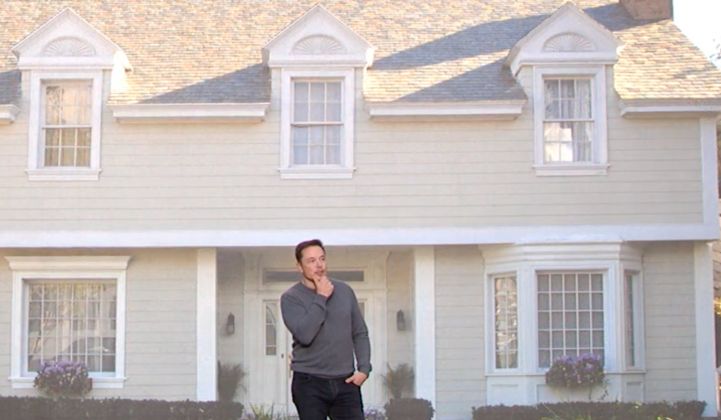Tesla CEO Elon Musk doesn't give many interviews, so his TED Talk appearance last week opened a useful window into his current thinking.
That includes an attitude of casually answering questions that reveal a great deal of previous calculation and strategy -- or nonchalant spontaneity. Like here, when asked about followups to Tesla's gargantuan Gigafactory:
"I think we'll announce locations for somewhere between two and four Gigafactories later this year," Musk said. "Yeah, probably four."
Regarding location, he noted, "We need to address a global market."
So there you have it. With the first factory not even complete, Tesla is ready to move on four more scattered around the world.
In order to meet humanity's needs for sustainable and clean energy, the denizens of Earth must build "most likely 100" Gigafactory-equivalent facilities, Musk said.
Give us a few decades to spread the solar roof
The choice to enter the solar roof market was a head-scratcher from a business strategy perspective, as we've written here and here. (And we expect to hear more in this week's earnings call, which we'll be covering.)
Actually integrating the product will be the hard part, and Musk has steered away from grappling with the logistics in public. The roofing industry has established sales channels that look very different from how Tesla sells its other products; it's not clear how the company will make its way into that segment. Nor is it clear if the product will work as advertised.
The road to market saturation will be long, Musk admitted in the TED Talk, on the order of 40 or 50 years. That's because people keep their roofs for 20 or 25 years, so replacement cycles are long.
That timeline indicates that the solar roof is a long-term play, not a short-term money machine.
Solar roofs have caused serious trouble for startups and big companies alike -- including Dow Chemical. No roofing products have been able to compete in a serious way. For Tesla, the roof hews more closely to the long-term mission of mass electrification. Musk thinks in decades, which is the only timescale where this product makes sense.
Speaking of timelines, Musk mentioned that the company will release two of the roof tile models this year and the other two early next year, rather than all at once.
As far as we know, the different tile products work the same way but have cosmetic differences, like French slate versus Italian terra cotta. Assuming the first two actually do come out this year and work as advertised, this won’t be much of a setback -- just a delay in offering a full range of styles for the same fundamental product.
Musk repeated his promise that the solar roof will cost less than a normal roof plus electricity, but added some color on the system's lifecycle.
“We thought about having the warranty be infinity, but then people thought, well, that might sound like we’re talking rubbish," he said. "But, actually, this is toughened glass. Well, after the house has collapsed and there’s nothing there, the glass tiles will still be there.”
With a generating lifetime of infinity, the solar roof's levelized cost of energy can definitely beat natural gas.
Truck time
Tesla's cars didn't take up too much airtime, which is perhaps more a testament to the breadth of Musk's portfolio than a lack of news from the auto sector.
He did note that the Model 3 is on track for starting production in July, but had more to say about the forthcoming semi-truck.
Decarbonization experts consider fossil-fueled trucking a particularly tricky problem to solve, because the vehicles need lots of power for heavy lifting, as well as the ability to drive long distances without recharging.
Tesla aims to prove the doubters wrong.
“They think the truck doesn’t have enough power or it doesn’t have enough range, and then with the Tesla Semi, we want to show that no, an electric truck actually can out-torque any diesel semi," he declared. "And if you had a tug-of-war competition, the Tesla Semi will tug the diesel semi uphill.”
Big claims. But then again, Musk believes boldness makes life worth living. That's what drives his plans for Martian colonization, not to mention his bevy of previously unfathomable plans to change the world.
"I think the value of beauty and inspiration is very much underrated, no question," he said. "But I want to be clear. I'm not trying to be anyone's savior. That is not the -- I'm just trying to think about the future and not be sad."
However, If you prefer your Muskian pronouncements about the future set to pulsing heavy metal riffs, I would direct you to "Fusion Reactor (In the Sky)," the new single from Musk-themed tribute band Raptor Command.



